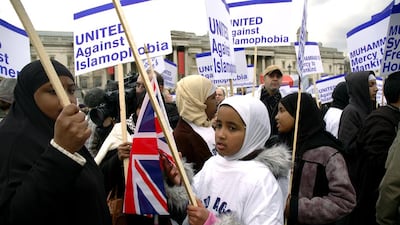Is Islamophobia racism? Politicians, lawyers, academics and community leaders in the UK's All-Party Parliamentary Group (APPG) on British Muslims have spent two years on consultation and research to come up with a definition of Islamophobia as this: "Islamophobia is rooted in racism and is a type of racism that targets expressions of Muslimness or perceived Muslimness". Critics soon emerged after the release of the group's report last month to dispute the definition, pointing out that it was wrong to conflate religion with race. Do they have a point?
There is little doubt anti-Muslim sentiment appears to be at an all-time high in Britain, across different sectors of society. As Baroness Sayeeda Warsi pointed out in the House of Lords, Muslim women were 85 per cent less likely to be offered a job if they wore a veil while 52 per cent of victims reporting hate crime were Muslim, the vast majority women.
Just last week, the Conservative Party failed to censure one of its most prominent figures, Boris Johnson, for a newspaper column in which he described women wearing burqas as resembling letterboxes or bank robbers. Despite the clearly anti-Muslim sentiment, he was cleared of breaking the party’s code of conduct. It was not an isolated occurrence, however. A large number of public figures and academics, as well as senior Tory figures themselves, have criticised the party for failing to address anti-Muslim bigotry within its own ranks, let alone in society. The debate, it seems, is not whether Islamophobia exists but rather, how it exists and how best to tackle it.
My own work with British Muslim communities began nearly 20 years ago, a few years after the Runnymede Trust, a race equality think tank, issued a report in 1997 that is credited with coining – or at least popularising – the term Islamophobia. The issue was important then. It’s far more so today, with the mainstreaming of populist anti-Muslim sentiment and bigotry.
There is a genuine debate to be had about its definition. For many years, I myself resisted the notion that Islamophobia was a type of racism. Traditional notions of race simply did not encompass the reality of what Muslims were. A religious community of, for example, Jews have fully embraced a notion of shared religious affiliation as an expression of ethnicity; Sikhs could argue the same. But Muslims have a vast variety of ethnicities and come from around the world. How then can be they be included under the rubric of one race?
The easy answer is – they can’t. But that is too easy an answer. And while I feel a certain level of discomfort with the appellation of “racism” to Islamophobia for those reasons, I publicly endorsed the definition, along with more than 750 British Muslim organisations, 80 academics and more than 60 cross-party parliamentarians. Their collective academic and practical expertise accounts for many decades of work in this area.
_____________
Read more from HA Hellyer:
Why British imams don't always speak the same language as their followers
Religion is a force for moral good – we just need to be careful who we follow
Generation Identity: how far-right groups are tapping into a need to belong
_____________
There are three good reasons to support the definition, which drew inspiration from the International Holocaust Remembrance Alliance’s definition of anti-Semitism. The first is that while the traditional understanding of race is based solely on ethnicity, there are other modern understandings as well. Professor Tariq Modood from Bristol University makes the argument that Islamophobia is a form of “cultural racism” and has written extensively along these lines over several decades. It is not a radical new idea in academia and has significant leverage.
Moreover, if we recognise that Islamophobia is a form of racism, then those battling against anti-Muslim bigotry in our midst have a variety of tools that can be used legitimately to fight it. The UK has complex and layered legislation dealing with racism, all of which could be deployed in the battle against hatred.
The third and final reason is that the definition isn’t perfect – but it does not need to be. The real question is only this: does the non-binding definition move things forward in a way which will empower those challenging anti-Muslim bigotry in the UK and render it unacceptable, in the same way anti-Semitism has become so? Or does it risk causing more harm?
While I might sympathise with some of the sentiments of those who see the definition as problematic in some way, I do not see the slightest bit of evidence to suggest that it will make things worse for people who are already vulnerable. On the contrary, it is entirely possible that it will further the discussion in a way that helps – and which will mean Islamophobic comments no longer pass the dinner table test.
Dr HA Hellyer is senior associate fellow at the Royal United Services Institute and the Atlantic Council

